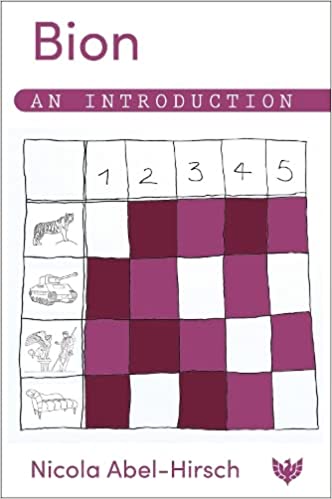Bion: An Introduction

Book Details
- Publisher : Karnac Books
- Published : 2023
- Cover : Paperback
- Pages : 152
- Category :
Psychoanalysis - Catalogue No : 96866
- ISBN 13 : 9781912691838
- ISBN 10 : 9781912691
Reviews and Endorsements
Nicola Abel-Hirsch is a masterful teacher of Bion’s works; knowledgeable of his history as an individual and a psychoanalyst. Like the best of teachers, she knows her subject intimately and explains even the most obscure concepts clearly. Her new book, Bion: An Introduction, displays her deep appreciation and knowledge of the work of Bion. I highly recommend Bion: An Introduction to all clinicians and psychoanalysts who want to understand Bion’s life and work in depth.
Lawrence J. Brown, author of Transformational Processes in Clinical Psychoanalysis: Dreaming, Emotions and the Present Moment and On Freud’s “Moses and Monotheism”
Underpinned by six opening thoughts and six closing thoughts as pointers, Bion: An Introduction is a masterpiece that captures the heart of Bion’s life and works brilliantly. Nicola Abel-Hirsch’s intimate knowledge of the thinking of W. R. Bion, combined with her deep capacity to dialogue with disciplines such as mathematics, philosophy, literature, the arts, and science, enables her to tackle a wide range of topics in a high-quality, original work. Bion: An Introduction is an essential, up-to-date, scholarly book for the study and exploration of Bion which intelligently stimulates new paths for thinking and dreaming.
Jani Santamaría, co-editor of Autistic Phenomena and Unrepresented States: Explorations in the Emergence of Self
Nicola Abel Hirsch has written a short, comprehensive new book on Bion, encompassing and interweaving his life and the progression of his work from the first to the final books and papers. Her extensive knowledge and profound understanding of Bion’s immense contribution to psychoanalysis makes her the ideal author for this book. The book is a pleasure to read; we feel her deeply engaged presence throughout, as if in a vivid dialogue with Bion in which she is always trying to understand him better. The compactness of the format consistently avoids over-simplification; one is left with an experience of fluidity and integration, and a sense of satisfaction for having been offered an accomplished, lively portrait of Bion the man and Bion the thinker.
Ignês Sodré, author of Imaginary Existences: A Psychoanalytic Exploration of Phantasy, Fiction, Dreams and Daydreams
In her book Bion’s inner life seems to come alive and is revealed through his work in a personal and biographical way, and one gets a picture of the emotional journey that gave rise to his intellectual thinking … Abel-Hirsch’s previous publication garnered universal praise and in this reviewer’s opinion she has again achieved something outstanding. It is touched with the spirit Bion possessed without being imitative, and she has brought her own tone of quizzical wonderment to her writing.
Michael Halton, The International Journal of Psychoanalysis, (2025), (106)(1):201-204

